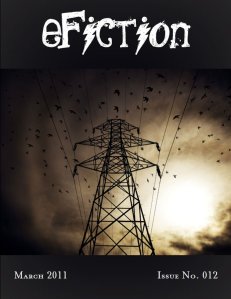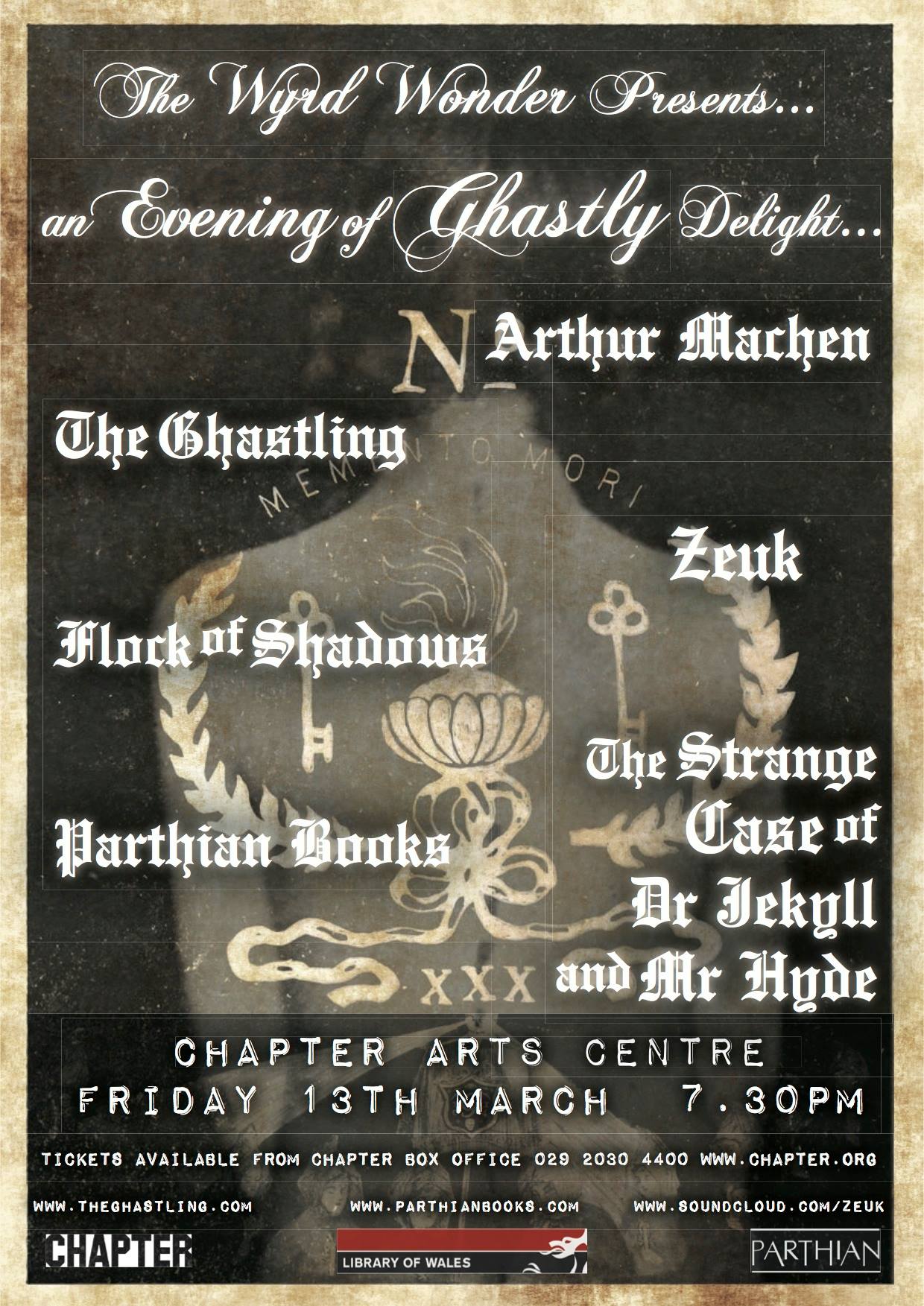eFiction Magazine #12
-Reviewed by Kurage Kobayashi–
eFiction Magazine is a monthly publication that can be read online at efictionmag.com. The magazine, however, is eclipsed by the surprisingly active and friendly site maintained by eFiction authors where the emphasis is on helping fellow writers to grow in craft and style. These contributors describe themselves as:
“…a group of writers, editors, and otherwise fiction-loving people who work together to learn everything that is interesting about stories and use that knowledge to put together a monthly magazine.”
The site is clean and easy to explore. On it are discussions on self publishing, book marketing, and a forum called The Coffee Shop where one is encouraged to “grab a cup of coffee and hang out for a bit”, figuratively, of course. It strikes me as a safe environment in which the creative learning process can be made less intimidating and experimentation is welcome, comparable to a virtual cooking class.
Of the seven pieces in the March issue the majority are flash fiction which is, by definition, often spare and unfinished. Considering the warm workshop atmosphere of eFiction’s online forums these stories could be further peer reviewed, edited and expanded upon in the future.
Jordan Hart in ‘Withdrawl’ presents us with a short and swift retelling of the Rumpelstiltskin tale as viewed through the lens of a blackout alcoholic. The piece is clever if self aware. It reads as a set up for a long and involved joke, something Roald Dahl would delight in spinning out and prolonging until the reader is left anxious for relief. Hart, however, sucker punch-lines us almost immediately, leaving us unsatisfied and feeling a bit cheated, much like his story’s pitiable protagonist.
Of the flash fiction the most deft and entertaining is Z.J. Woods’s ‘A Breach of Warranty’. In a short span Woods introduces us to a world where children meet in secret to engage their parents’ HouseholdHelper Modular Automata in gladiatorial combat. There is a playfulness to Woods’s tone and word choice that makes up for the overwhelming crush of characters (four robots and three children). When the lighthearted romp takes a darker turn into the philosophy of electronic life and death the reader is drawn headfirst with the characters on the page.
Two pieces in this collection cross the line from flash fiction into short story territory, one of which is the true standout work of this edition. In ‘All of us and all of the moments of our lives’ by J. Eric Miller we are made privy to a private and fully formed world, the universe inside the protagonist’s head. We awake with our (regrettably anonymous) narrator to find both his bowels and brain in turmoil. While performing his morning rituals and complaining of his intestinal distress we are introduced through subtle and gentle clues to the time, place and persons involved in a complex relationship between two families with a shared son.
By keeping the arena of action entirely internal Miller expertly overlays a sense of hurtling progression and dread onto what is essentially a series of mundane events culminating in a severe mental breakdown. As such Miller’s work is the most whole and intriguing piece in the issue.
The longest piece, Aaron Wilson’s ‘The Return ofMelanplus Spretus, is a thematically ambitious and tightly plotted tale of man’s hubris and natural disaster.
Unfortunately the action built upon this steady foundation reads on the level of camp absurdism. Wilson concerns himself with a plague of locusts terrorizing a small Colorado farming community, consisting of stereotypical characters for whom it is difficult to feel sympathy. By far the most understandable character is the hoard of locusts itself.
With another round of editing Wilson could turn this into a fine and ominous tale, one that is half as long. He could use the reclaimed space to paint a less caricatured portrait of Colorado potato farmers so that there is a real sense of loss when disaster strikes.
If Wilson unintentionally descends into the realm of camp , the guest author, Jeff Baker, does so deliberately.
In his author spotlight interview Baker explains that ‘The Black Wind’ is an ode to Lovecraft. He then presents the tale of an academic’s descent into madness due to his obsession with a book, The Journal of Colonel William Fawcett: World Reknowned Explorer 1886and the bloodthirsty Amazonian deity described within. In classic Lovecraft fashion the story centers around the craven misbehavior of supposedly civilized men that is just as wildly over-inflated as the title of Fawcett’s journal.
Unfortunately Baker’s word choice is spotty, drifting between nineteenth century verbiage and twentieth century colloquialisms, and though there is plenty of book flinging action (books being smacked from hands, swept from tables) Baker never fully commits to the hysterics for which Lovecraft is so well known. If we are to have insane and ancient murderous urges, vile supernatural entities and vain academics, then give us also the absurd and delightful orgy of grotesque and baroque detail that can be found in, for example, corpses clawing their way through the basement walls of Herbert West – Reanimator.
In ‘Jazz Night’ Baker delivers a vignette that showcases his animator’s eye for action and visual flair. Baker uses the familiar trope of an ageing hitman out to prove his worth in order to showcase his flair for dramatic imagery and dynamic movement as well as his campy, pulp sensibility. Baker makes up for occasional missteps with clever noir labels for his futuristic world, people and places and the technologies employed by these characters. The action is visceral and logical and the characters are larger than life (the private police dress like Roman soldiers, the hitman is veined with cybernetic fibres). The world of New Venice is garish and dramatically lit, in the fashion of a comic book.
Baker’s work is fun, cemented in genre, and forgivably unoriginal. It is also representative of most of the pieces in the issue in that it feels unfinished. What is truly dismaying about eFictionis the number of typos littering this issue. But if overall the contents of eFiction’s March edition seem half-baked, they do so like a chocolate cake with a molten centre. After all, who hasn’t enjoyed licking the batter from the spoon? The joy of butter, raw egg and processed sugars is a delightful, if ultimately guilty, pleasure.




Pingback: Review, and more reviews | z. j. woods